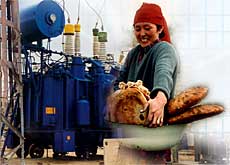Champion of poor comes of age at WTO

A Swiss initiative to help poorer countries defend their interests during world trade negotiations has proved so successful that the project and its budget are being expanded.
On Monday, the agency, which has been sponsored by the Swiss government for the past four years, was transformed into an intergovernmental organisation.
Seven donor countries including Switzerland have pledged funding of SFr18 million over the next five years to support the Geneva-based agency for international trade information and cooperation (Aitic).
“The Swiss government [saw] that something was needed in that field and they had the discipline and the determination to make it work,” Aitic’s director, Esperanza Durán, told swissinfo.
Having a voice
Aitic was set up in 1998 to help less-advantaged countries make themselves heard at the World Trade Organisation.
The Swiss state secretariat for economic affairs funded its annual budget of SFr1.5 million.
“This was an initiative of the Swiss government to assist the countries that have not actively participated in international trade to have a louder voice and to defend their interests in the negotiations that take place under the aegis of the WTO,” said Durán.
Less advantaged nations include the 49 least developed countries as defined by the United Nations as well as smaller developing countries (such as Venezuela) and countries in transition such as the formerly communist central Asian nations.
Aitic is particularly valuable for “non-resident” WTO member states which can’t afford to have a permanent trade mission in Geneva.
Of the 144 WTO member states, 34 have non-resident status.
They are mostly poorer nations in Africa, Central Asia or Latin America, which deal with the WTO from embassies in Brussels, London or Paris or further afield.
Defining priorities
Aitic has a reference library, meeting and reading rooms and on-line stations but the main attraction is the personalised assistance the agency’s expert staff provides on request.
Representatives from developing countries can seek the help of Aitic to clarify an issue or obtain data to underpin an intervention they will be making.
“We can help if a delegate is attending a meeting and wants to know the implications of certain provisions, which are being negotiated,” said Durán.
“Also how best to make use of a country’s resources to put its point forward.
“We also help them to define priorities. A very small country will not have to follow all the subjects in the WTO.
“There may be two or three important subjects which touch on their basic interests – negotiations on basic telecommunications or market access in agriculture or the liberalisation of textiles.”
Summarising complex documents is another key aspect of the organisation’s work.
Aitic’s five permanent staff and five support staff also answer requests that arrive by e-mail or fax.
All of the assistance is free of charge.
Translating documents
Although the WTO has three official languages – English, French and Spanish – Aitic staff often have to translate documents because of a shortage of interpreters.
“Sixty per cent of the least developed countries have French as their first or second language,” said Durán.
“So they are at a disadvantage when very complex and technically difficult subjects are discussed particularly from the start if they do not have these documents translated.”
Duran told swissinfo she was convinced the growth in international trade offers more opportunities to less advantaged countries provided they know how to negotiate.
“If a small country knows what its interests are and knows what is being discussed, it can play a role as well,” she said.
“We have seen the weight of small and vulnerable countries in the negotiations when there is an issue that is particularly important for them.”
Advantages
Durán said recruitment of staff would probably now be easier because Aitic was competing on an equal footing with other intergovernmental organisations.
She said the new status would also make it easier to operate in the international arena.
“We were trying to assist the representatives of government and it was not commensurate with our status as a private organisation.”
Monday’s signing ceremony was co-chaired by David Syz, Swiss secretary of state for economic affairs and Rénald Clérismé, ambassador and permanent representative of Haiti to the WTO, and co-chair of the task force on AITIC’s development.
Denmark, Finland, Ireland, the Netherlands, Sweden and the United Kingdom are the other donor countries.
swissinfo, Vincent Landon
Aitic was set up by the Swiss government in 1998.
It helps poorer countries during world trade negotiations.
The agency became an intergovernmental organisation on Monday.
Seven donor countries have agreed to provide funding of SFr18 million.

In compliance with the JTI standards
More: SWI swissinfo.ch certified by the Journalism Trust Initiative
You can find an overview of ongoing debates with our journalists here . Please join us!
If you want to start a conversation about a topic raised in this article or want to report factual errors, email us at english@swissinfo.ch.